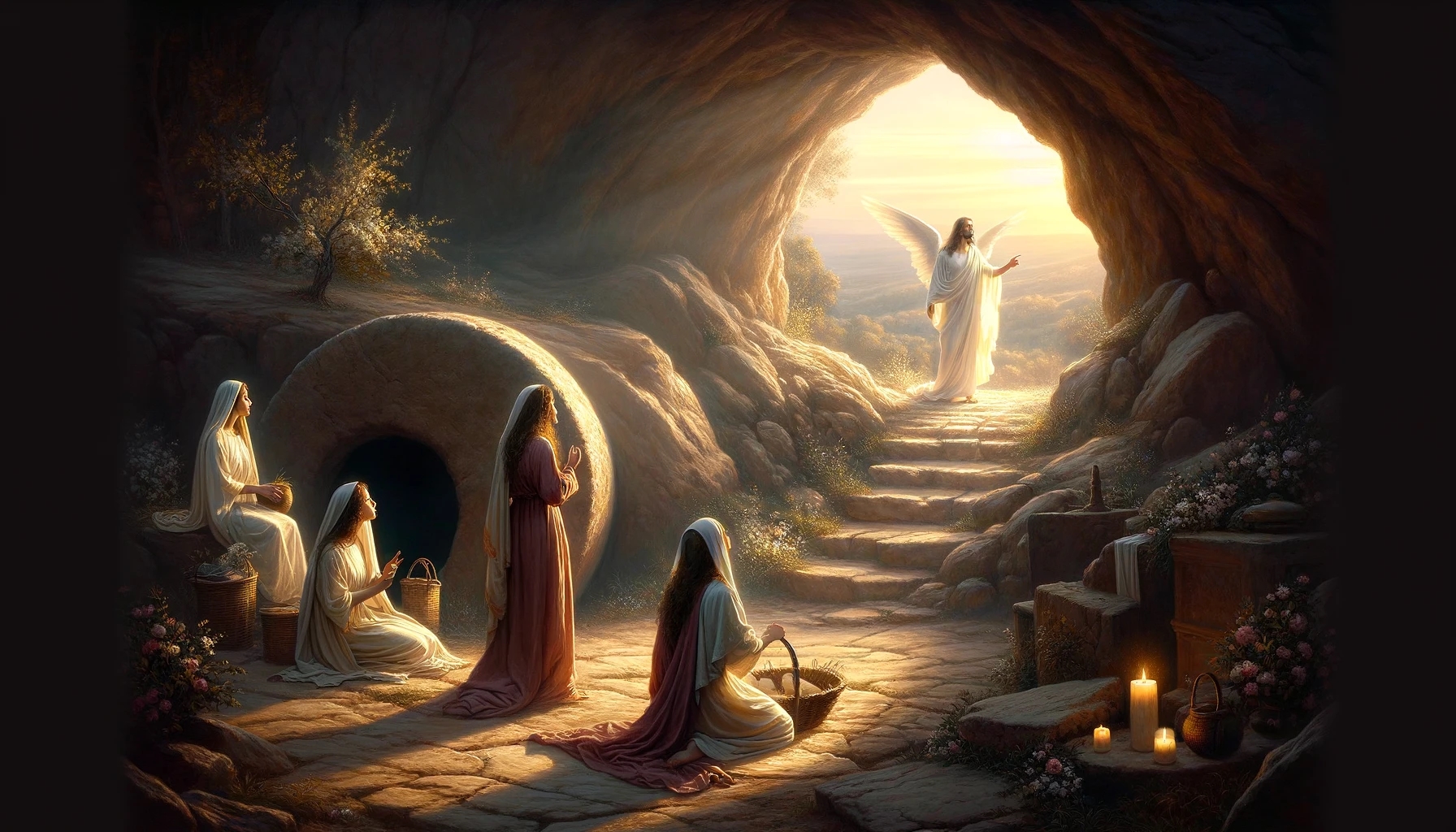


13.3 The Women at the Tomb
From Silence to Proclamation
Read Mark 16:1–8. What happened and how did the women initially react?
In Mark 16:1–8, we see the women who go to Jesus’ tomb after the Sabbath to anoint his body, but they encounter an unexpected reality: the tomb is empty, and an angel announces to them that Jesus has risen. The women initially react with fear and trembling and flee from the tomb without telling anyone.
This reaction of the women contrasts with the reader’s knowledge, who knows from the beginning about Jesus’ identity as the Messiah. However, in the Gospel of Mark, there is a repeated silence about Jesus’ true identity and his miracles. Jesus apparently wanted to ensure that the time for his revelation came at the right moment, in accordance with prophetic timelines.
At first, the women are so overwhelmed with fear and amazement that they do not immediately share what they have seen. But this silence does not last long. At the end of the Gospel of Mark, we learn that the message of Jesus’ resurrection was spread: “But they went out and preached everywhere” (Mark 16:20). The silence is broken, and the good news of Jesus’ victory over death becomes the central message of Jesus’ followers.
This story reminds us that we are also called not to remain silent but to boldly and joyfully proclaim the hope and new life made possible through Christ’s resurrection. What began in fear ends in the power and confidence of the Gospel.
Why must we not remain silent about Jesus and his deeds? With whom can you talk about Jesus and the plan of redemption today?
We must not remain silent about Jesus and his deeds because his message is the foundation of hope, forgiveness, and eternal life. Jesus’ resurrection and his sacrifice on the cross are the path to redemption for all people. If we remain silent about him, the good news of God’s love and salvation plan for the world remains untold, and many people might not experience the liberating truth that could change their lives. Jesus himself gave us the mission to carry his message forward: “Go into all the world and preach the gospel to all creation” (Mark 16:15).
Today, you can talk about Jesus with people in your immediate environment—friends, family, colleagues, or neighbors. It doesn’t always have to be a long sermon. Sometimes, sharing your own experiences of how faith has given you strength, hope, or peace is enough. Even in everyday conversations, you can sow small seeds of the Gospel that God can use to touch hearts.
Like the women at Jesus’ tomb, who initially remained silent out of fear and uncertainty, we sometimes face the challenge of sharing our faith. The message of Jesus’ resurrection, which first brought fear to the women, ultimately became a source of courage and joy. This transformation reminds us that we are also called to overcome our fears and boldly proclaim the good news.
In our daily lives, we encounter many situations where we can bear witness—not only through words but also through our actions, behavior, and the expression of our hope in difficult times. The story of the women at the tomb shows us that even in moments of uncertainty and fear, faith ultimately triumphs, and proclaiming the resurrection power of Christ is central to our lives as Christians.
This means that our faith should not remain a private matter. The hope we have through Christ is a message that others need to hear because it can change lives—just as it changed the lives of the disciples and the women at the tomb. Proclaiming Jesus’ resurrection is a call to all of us to stand firm in our faith and share the Gospel wherever we are, whether in the family, among friends, or at the workplace.
In everyday life, we can bear witness in both small and significant moments by sharing the love and hope of Christ through our behavior, our words, and our support for others. The good news of Jesus is not just a historical fact but a living call that resonates in every moment of our lives.

Jesus’ resurrection reminds us that from every end, a new beginning full of hope and life can emerge.
(Visited 23 times, 1 visits today)





















